OTR, Take 46: Fontaines D.C. - Skinty Fia
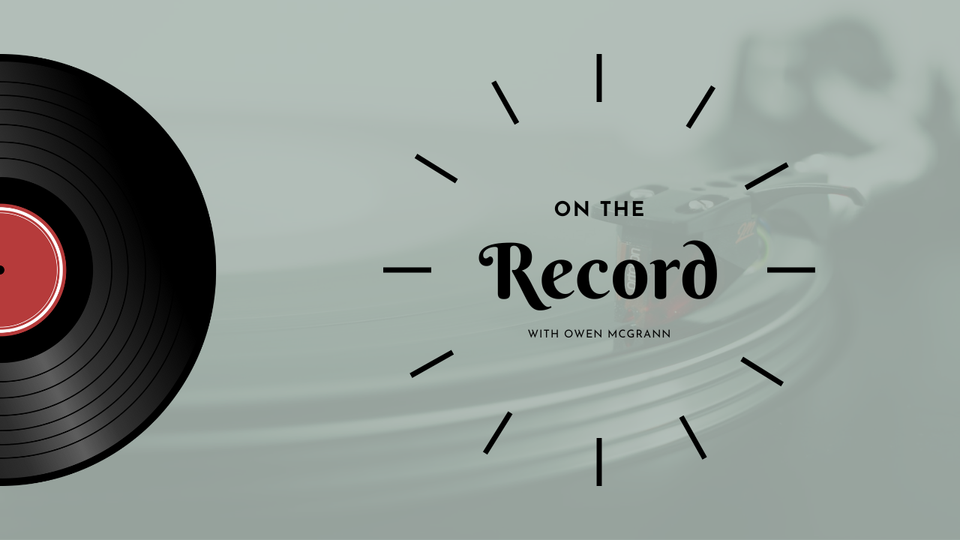
Listen to this week's record on Tidal (they pay artists better!) or Spotify (if you must).
The saddest tongue is in your head
How do you measure time? In hours and minutes and seconds, you dolt. No, I mean how does time reveal itself to you? Not, what does your calendar look like but what are your markers of felt time?
What are the ways in which we feel our passage through time, our sense of change? How do you experience entropy? Things fall apart and all that.
I'm certain there are things that denote this to you, even if you haven't fully thought it through. The speed with which I go through pairs of walking shoes is one for me. It's a more coherent unit of time for me than hours or days. Other units that are meaningful to me include how often I have to buy guitar picks: the more frequent this purchase, the more creatively satisfied I am, and (generally) the faster time is passing. Back when I was dying, I could get a sense of how depressed I was by how often I had to buy shampoo.
How much of your own life are you missing if you consider only the alarms screaming from your phone and the number of meetings booked on your calendar? In our productivity-obsessed culture, have we utterly debased our sense of self-worth by willingly, if unwittingly, becoming time whores?
Looking for a thing no doer's done
It's been an interesting week, meeting with a number of people about how I'm building out Purely Estates. Here's what I find so interesting about it: all of the attorneys I speak with tell me I shouldn't do it this way, that I'm wildly off base and I can't help but feel that I'm breaking Omerta. This is a profession, not a business.
But everybody else I speak with gets it. They get it in a way that I'm still grasping at. I had someone ask if they could invest in the firm; he was put off to learn that only licensed attorneys are permitted to have an ownership interest in a law firm – and seriously, WTF? Why shouldn't non-attorneys own parts of law firms? It's an exciting experience, trying to give form and shape to something I don't quite understand, yet the people it's designed to serve do. I don't pretend that I'm the first to do something like this, but it's unusual enough that it feels like learning a song by hearing someone describe it ("eh, it's pretty quick with a bright, happy sound in 4/4 I think and the lyrics go like...") rather than hearing the damned thing and replicating it.
There's a part of me that thinks, there's an easier way to do this. And of course there is: but everyone else is doing that. Does this raise the risk of my undertaking? You bet. But I'm finished with playing small. This firm's mission is bigger than just helping families get good estate plans – not that there's anything wrong with that as a mission. As egomaniacal as it may sound, the mission is to rescue as many lawyers as I can from the "profession." More details later. Or not. It's always possible I'll chicken out and play small, but...
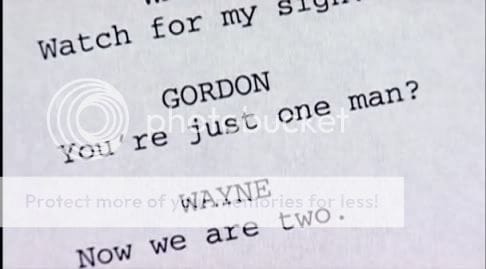
And the feeling's coming with the finish line
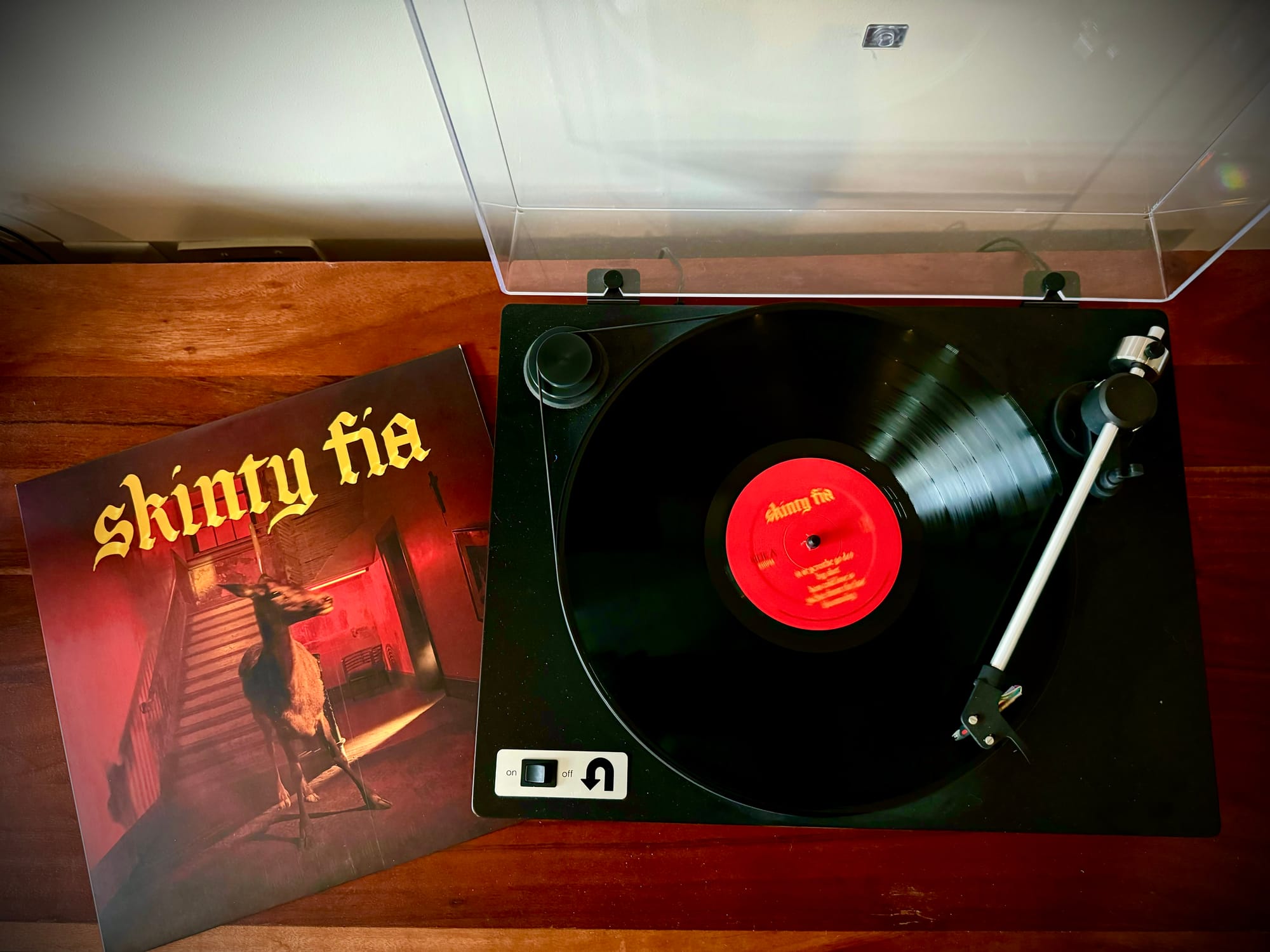
We're heading to Ireland with today's album – or Dublin by way of London, where most of Fontaines D.C. now live. In fact, an undercurrent of Skinty Fia is the discongruity of being Irish in England. The feeling of being able to pass, to speak the language and not look out of place, but still to be other. But I'm getting ahead of myself now, aren't I?
Fontaines D.C. are one of my favorite new bands. They hit all of my musical erogenous zones. Off-kilter, sparse arrangements? Hyperliterate lyrics? Unique vocals? Check, check, and check. You can hear the influence of several bands, mostly of the postpunk variety, in Fontaines D.C.'s sound, but they have a very distinct sound. I could pick them out immediately from a postpunk sonic lineup.
Layer on top of that the fact that the band is unapologetically, insistently Irish, speaking to distinctly Irish issues and I'm in love. It's not the fact that they're Irish, but that they don't try to universalize things and speak to everyone. They're from somewhere and of that place.
Last weekend, I was chatting with Chad Aboud and he asked when the Cranberries "Zombie" would make its way to OTR. I guess the answer is today, and what I love about "Zombie" is exactly this local focus.
We've all heard this song, and can bring Dolores O'Riordan's righteous screaming of Zaahhh-oooom-bie! to the very front of our mind's ear. But many Americans don't place the focus on the violence of the Irish Troubles. It is an Irish song in the way that anything U2 put out after about The Joshua Tree is not. (U2 became obsessed with America around that point and reduced themselves to middling tawdle.)
Fontaines D.C. place their songs squarely in Ireland, focused on Irish preoccupations and history. Right smack dab in the middle of "I Love You" (a song title for the ages, when you get inside the headspace of the song), you find this line that might not catch you, unless you know something of Irish history:
But this island's run by sharks
with children's bones stuck in their jaws
And boy does that line hit if you know anything about Ireland's truly shameful 20th-century (this isn't ancient history!) practice of, effectively, kidnapping children from unwed mothers. Then there's the mass grave of 800 babies and children at Bon Secours Mother and Baby Home in Tuam, County Galway. In this same song, the Grian Chatten drops echoes of Bishop McQuaid ("I sucked the ring off every hand") and leaves us with this:
Hold a mirror to the youth and they will only see their face
Makes flowers read like broadsheets
Every young man wants to die
And here we are, leaving flowers as headlines and lamenting loss: "I loved you like a penny loves the pocket of a priest."
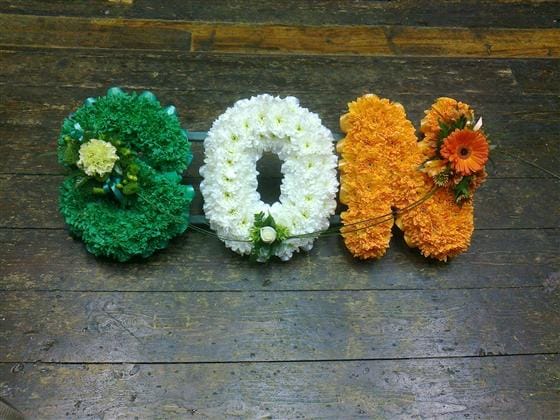
I will wear you down in time
I wonder sometimes what we'd be capable of if we were brave enough to face our own histories, our own actions, and work through them in as brutal a way as artists like Fontaines D.C. do. To bring to the surface the aspects of our lives, our petty grievances, our meanness that inevitably seeps out – and not simply brush it under the rug but accept it as part of who we are and, crucially, to be mindful to do better.
Would it be too hard? Would we crumble under the weight of our history? I can assure you there are many, many things I have done that I am deeply shamed by. I've hurt people deeply, whom I doubt are ready to forgive, despite the passage of time. Is this another measure of time, perhaps? The half-life of hurt resolving into forgiveness or acceptance?
Or is it possible to build something stronger by facing up to ourselves and our histories? To create some antifragility in our lives. How can we learn to be better if we don't study our mistakes? Note: I didn't say obsess over our mistakes.
They claim to know the form in which genius comes
Everything is connected. Not in the conspiratorial manner so in fashion these days. (This is superficially a music newsletter, so I suppose this is the place where I mention that Taylor Swift is a CIA asset rigging the Super Bowl to set up mass election interference with her boyfriend, Mr. Pfizer. Her power truly knows no bounds!)
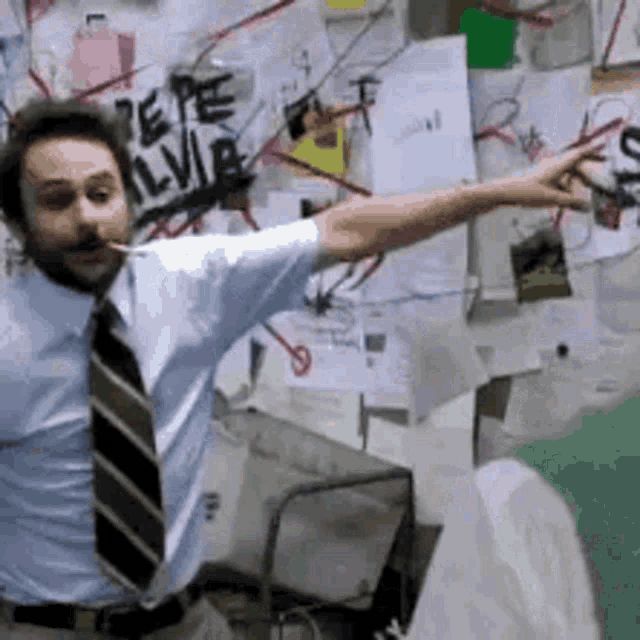
I've spent much of the year facing up to failures on my part, business-wise, to build something new and better. To many of my close confidants, this has seemed a particularly odd time to be doing this work: both of my firms are doing better than they ever have. "Why now?" is a question I've been asked a lot recently.
As my friend Robb Gilbear recently said, "The hardest change is the one we don't have to make." But we only get one shot at this – not at any particular business (although, perhaps), but at going after the life and business you want. If we don't learn from our past and get better, what are we even doing? If when we see an opportunity not just to get better but to jump into asymptotic improvement, what the fuck are we in business for but for that opportunity? What else are we going to do with our time?
How many pairs of walking shoes before I decide to do what I want to do? To build up the courage to do it without getting permission?
Back when I was dying. I caught myself writing that earlier and nearly erased it. Maybe it was a touch purple for my prose inclinations.
But here's the thing: I still am – that hasn't changed. And so are you. Life is an incurable condition. So what are we gonna do to make our sense of felt-time bountiful? I'm off to buy some guitar picks and dream up a new way of running a legal business.
You?
Member discussion